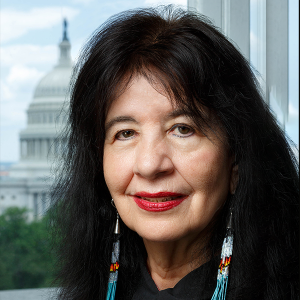For Darlene Wind and James Welch
I think of Wind and her wild ways the year we had nothing to lose and lost it anyway in the cursed country of the fox. We still talk about that winter, how the cold froze imaginary buffalo on the stuffed horizon of snowbanks. The haunting voices of the starved and mutilated broke fences, crashed our thermostat dreams, and we couldn't stand it one more time. So once again we lost a winter in stubborn memory, walked through cheap apartment walls, skated through fields of ghosts into a town that never wanted us, in the epic search for grace.
Like Coyote, like Rabbit, we could not contain our terror and clowned our way through a season of false midnights. We had to swallow that town with laughter, so it would go down easy as honey. And one morning as the sun struggled to break ice, and our dreams had found us with coffee and pancakes in a truck stop along Highway 80, we found grace.
I could say grace was a woman with time on her hands, or a white buffalo escaped from memory. But in that dingy light it was a promise of balance. We once again understood the talk of animals, and spring was lean and hungry with the hope of children and corn.
I would like to say, with grace, we picked ourselves up and walked into the spring thaw. We didn't; the next season was worse. You went home to Leech Lake to work with the tribe and I went south. And, Wind, I am still crazy. I know there is something larger than the memory of a dispossessed people. We have seen it.
Published:
1990
Length:
Regular
Literary Movements:
Native American Renaissance
Anthology Years:
2023
Themes:
Memory & The Past
Nature
Poetic Form
Literary Devices:
Epigraph
a short quotation or saying at the beginning of a book or chapter, intended to suggest its theme
Metaphor
a comparison between two unrelated things through a shared characteristic
Simile
a comparison between two unlike things using the words “like” or “as”

